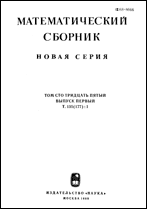|
Representation of arbitrary functions by certain special series
A. P. Khromov
Abstract:
Let $M(x,t)$ be continuous for $0\leqslant t\leqslant x$, $0\leqslant x\leqslant1$ and let $g(x)$ be of bounded variation in $[0,1]$. Further, let $M(x,t,\lambda)=\sum_{k=0}^\infty\lambda^kM_k(x,t)$, where $M_1(x,t)=M(x,t)$, and $M_k(x,t)=\int_t^xM_{k-1}(x,\tau)M(\tau,t)\,d\tau$ for $k>1$. The paper studies the problem of the representation of a certain class of functions by series whose partial sums are given by
$$
P_n(x,f)=\frac1{2\pi i}\int_{C_n}\frac{\varphi(x,\lambda)}{L(\lambda)}\int_0^1\int_0^xM(x,t,\lambda)f(t)\,dt\,dg(x)\qquad(n=1,2,\dots),
$$
where $f(x)$ is the expanded function, $\varphi(x,\lambda)=\psi(x)+\lambda\int_0^xM(x,t,\lambda)\psi(t)\,dt$, $\psi(x)\in C[0,1]$, $L(\lambda)=\int_0^1\varphi(x,\lambda)\,dg(x)$ and is $\{C_n\}^\infty_{n=1}$ a sequence of circles in the $\lambda$-plane with common center at zero and radii $r_n\uparrow+\infty$. This problem contains, in particular, the problem of expansion in the eigenfunctions of an ordinary differential equation in $[0,1]$ with certain irregular decomposing boundary conditions.
Bibliography: 5 titles.
Received: 26.11.1969
Citation:
A. P. Khromov, “Representation of arbitrary functions by certain special series”, Math. USSR-Sb., 12:2 (1970), 159–176
Linking options:
https://www.mathnet.ru/eng/sm3506https://doi.org/10.1070/SM1970v012n02ABEH000915 https://www.mathnet.ru/eng/sm/v125/i2/p165
|


| Statistics & downloads: |
| Abstract page: | 423 | | Russian version PDF: | 122 | | English version PDF: | 26 | | References: | 67 |
|




 Contact us:
Contact us: Terms of Use
Terms of Use
 Registration to the website
Registration to the website Logotypes
Logotypes








 Citation in format
Citation in format 